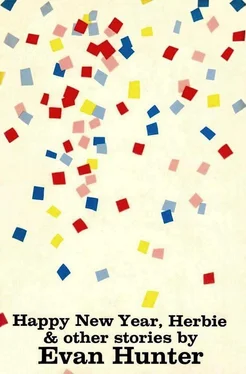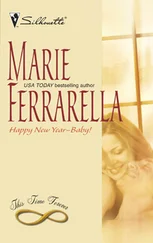“But I don’t...”
“A hooker is a prostitute!” Randolph said, his voice rising. “Now come off it!”
“Oh,” the girl said.
“Oh,” Randolph repeated sarcastically. “Now how long?”
“This... this was my first time.”
“Sure.”
“Really,” she said eagerly. “I’d... I’d never gone out looking for... for men before. This was my first time.”
“And you picked me, huh?” Randolph asked, unbelievingly. “Well, honey, you picked the wrong man for your first one.”
“I didn’t know you were a cop.”
“Now you know.”
“Yes. Now I know.”
“And you also know you’re in pretty big trouble.”
“Yes,” the girl said.
“Good,” Randolph answered, grinning.
Actually, the girl wasn’t in as much trouble as she imagined herself to be — and Randolph knew it. She had indeed stopped him on the street and asked, “Want some fun, mister?” and Randolph had immediately put the collar on her. But in the city for which Randolph worked, it would have been next to impossible to make a prostitution charge stick. Randolph conceivably had a Dis Cond case, but disorderly conduct was a dime-a-dozen misdemeanor and was hardly worth bothering with in a precinct where felonies ran wild. So Randolph knew all this, and he had known it when he collared the girl, and sat now with a grin on his face and watched her, pleased by her troubled expression, pleased with the way her hands fluttered aimlessly in her lap.
“You can get out of it,” he said softly.
“How?” the girl asked eagerly.
His voice dropped to a whisper. “If you know the right cop,” he said.
The girl stared at him blankly for a moment. “I haven’t any money,” she said at last. “I... I wouldn’t have done this if I had money.”
“There are other ways,” Randolph said.
“Oh.” She stared at him and then nodded slightly. “I see.”
“Well?”
“Yes,” she said, still nodding. “All right. Whatever you say.”
“Let’s go,” Randolph said.
He walked briskly to the railing and leaned on it. To no one in particular, he said, “I’ll be back in an hour or so.” Before he turned, he noticed the curiously sour expression on Gene Fields’ face. Briskly, he walked to the girl. “Come on,” he said.
They went down the steps to the ground floor. At the desk, a patrolman was booking a seventeen-year-old kid who was bleeding from a large cut behind his car. The blood had trailed down his neck and stained his tee-shirt a bright red. The girl gasped when she saw the boy, and then turned quickly away, heading for the steps.
“If he’s the one they’re booking,” Randolph said, “I hate to think what the other guy must look like.”
The girl didn’t answer. She began walking quickly, and Randolph fell in beside her. “Where to?” he asked.
“My house,” she said. An undisguised coldness had crept into her voice.
“Don’t take this so big,” he said. “It’s part of a working day.”
“I didn’t know that,” the girl said.
“Well, now you do.”
They walked in silence. Around them, the concrete fingers of the city poked at the October sky. The fingers were black with the soot of decades, grimy fingers covered with waste and not with the honest dirt of labour. The streets crawled with humanity. Old men and young men, kids playing stickball, kids chalking up the sidewalks, women with shopping bags, the honest citizens of the precinct — and the others. In the ten minutes it took them to walk from the precinct to the girl’s apartment, Randolph saw fourteen junkies in the streets. Some of those junkies would be mugging before the day ended. Some would be shoplifting and committing burglaries. All would be blind by nightfall.
He saw the bright green and yellow silk jackets of a teenage gang known as “The Marauders,” and he knew that the appearance of a blue and gold jacket in their territory would bring on a street bop and broken ribs and bloody heads.
He saw the hookers and the pimps and the sneak thieves and the muggers and the ex-cons and the kids holding J. D. cards and the drunks and the fences and the peddlers of hot goods — he saw them all, and they surrounded him with a feeling of filth, a feeling he wanted desperately to search out and crush because somewhere in the filth he had lost himself.
Somewhere, long ago, a young patrolman had cracked a liquor store holdup, and the patrolman had been promoted to Detective/Third Grade, and the patrolman’s name was Frank Randolph. And somewhere back there, the patrolman Frank Randolph had ceased to exist, and the detective Frank Randolph had inhabited the shell of his body. The eyes had turned hard, and the fists had turned quick, and the step had turned cautious because there was danger in these streets, and the danger awakened every animal instinct within a man, reduced him to a beast stalking blood in the narrow, dark passages of the jungle.
There was hatred within the muscular body of Frank Randolph, a hatred bred of dealing with tigers, a hatred which included the timid antelopes who also lived in the forest.
And so he walked with a young, thin girl, walked toward her apartment where he would use his shield as a wedge to enter her bed and her body. He had begun using his shield a long time ago. He was as much an addict to his shield as the junkies in the streets were addicts to the white god.
The tenement stood in a row of sombre-faced buildings, buildings that solemnly mourned the loss of their latter-day splendor. The fire escapes fronting each building were hung with the trappings of life: blankets, potted plants, pillows, empty beer cans, ash trays, guitars. Autumn had come late this year, lingering over the slow death of a hot summer, and the cliff dwellers had taken to their slum terraces, the iron-barred rectangles that gave them a piece of sky and a breath of air.
“This is it,” she said.
He followed her up the stoop. A woman was sitting on the steps, knitting. She glanced up at him as he passed, sensing immediately, with the instinct of self-preservation, that he was a cop. He could almost feel her shrinking away from him, and his own instinct asked the question, “What’s she done to be afraid of?”
Garbage cans were stacked in the hallway. The refuse had been collected earlier that day, but the cans were never washed and they filled the air with the stink of waste. There was a naked light bulb hanging in the entrance foyer, but it would not be turned on until dusk.
The girl climbed the steps ahead of him. He walked behind her; her legs were remarkably good for a girl so thin. They climbed steadily. There were voices behind the doors. He heard the voices in the medley of sound, and he reflected on the doors he had broken, a quick flatfooted kick against the lock to spring it, since he’d been a detective. Rarely had he knocked on a door. Rarely had he given the occupant a chance to unlatch it. The kick was quicker, and it precluded the possibility of a door being opened to reveal a hostile gun inside.
“It’s on the third floor,” the girl said.
“All right,” he answered, and he kept following her, watching her legs.
“Be careful, there’s a broken bottle.”
He skirted the shards of brown glass, smelling the whiskey fumes as he passed the alcohol-soaked wood. The girl stopped at a door at the end of the hall. She unlocked it and waited for him to enter. When they were both inside, she put the police lock in place, leaning the heavy, unbending steel bar against the door, hooking it securely into the steel plate embedded in the floor, so that it formed a formidable triangle against which entrance was impossible.
The kitchen was small but clean. A round table sat in the centre of the room, and a bowl was on the table. A single apple rested in the bowl. The girl went to the window and lifted the shade. Light, but not sunlight, entered the room. It was a pale light that bounced from the brick walls of the tenement not four feet away, leaping the airshaft between the building. The girl turned.
Читать дальше












